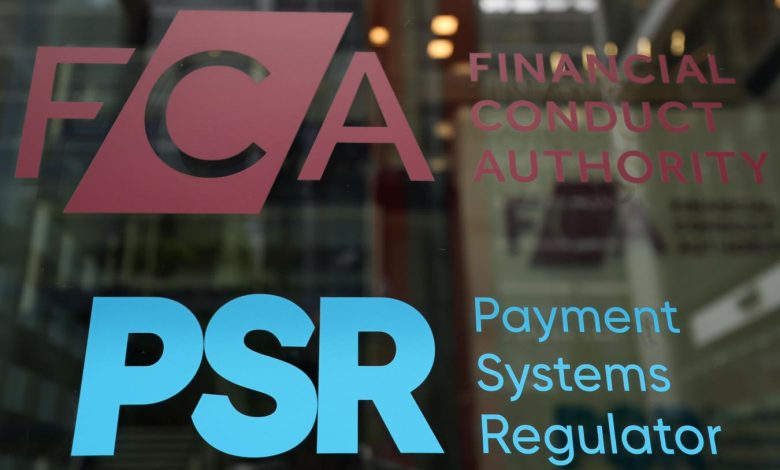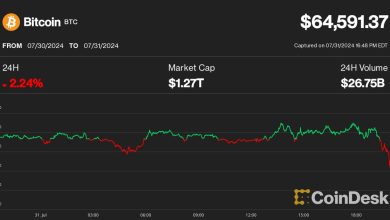UK Investors Finally Get Tax-Free Crypto Access Via ISAs And Pensions

A sign on the window of the Financial Conduct Authority (FCA) headquarters. Photographer: Hollie Adams/Bloomberg
© 2023 Bloomberg Finance LP
After four years of regulatory delays that pushed UK retail investors toward risky offshore exchanges and leveraged treasury schemes, the FCA’s crypto ETN approval finally delivers what investors wanted: legitimate crypto exposure in tax-advantaged wrappers.
The Four-Year Tax Efficiency Gap
The January 2021 ban on crypto ETNs was a misguided attempt to protect retail consumers from highly speculative cryptoassets (Bitcoin traded at $40k at the time). The FCA wanted to protect retail investors from volatile, poorly understood assets. But prohibition created a more dangerous problem: it forced the 12% of UK adults who wanted crypto exposure into unregulated alternatives while denying them the tax efficiency available to every other mainstream investment.
From October 8th 2025, UK investors can finally hold crypto ETNs (including BlackRock’s Bitcoin ETF) in their £20,000 annual ISA allowance and pension contributions. The change means crypto gains grow tax-free in ISAs and pension contributions receive tax relief, advantages that direct crypto ownership never provided.
The timing couldn’t be better. While UK retail investors were locked out of regulated crypto products, they gravitated toward digital asset treasury companies riddled with hidden leverage and sustainability questions. The FCA’s reversal offers proper regulatory oversight just as these alternative vehicles show signs of systemic risk.
How Prohibition Created Bigger Problems
NEW YORK, NEW YORK – JULY 26: FTX Founder Sam Bankman-Fried arrives at Manhattan Federal Court for a court appearance on July 26, 2023 in New York City. Bankman-Fried appeared for a bail hearing after federal prosecutors accused him of witness tampering after leaking the personal writings of Caroline Ellison, his former girlfriend and business partner. (Photo by Michael M. Santiago/Getty Images)
Getty Images
The 2021 ban didn’t eliminate crypto demand. UK investors simply found workarounds, most of them worse than the products the FCA restricted. Offshore exchanges like FTX welcomed UK customers until spectacular collapses wiped out billions in retail funds. Those platforms offered no regulatory protection, no compensation schemes, and frequently commingled customer funds with proprietary trading.
Digital asset treasury companies emerged as another alternative. These publicly traded vehicles use debt and equity financing to accumulate crypto assets, then trade at premiums to their underlying holdings. Retail investors bought shares hoping to gain crypto exposure through traditional brokerage accounts.
The appeal was obvious. Treasury companies offered crypto exposure through familiar stock market mechanisms. Some even qualified for ISA inclusion. But these vehicles came with hidden leverage, counterparty risks, and management fees that ETNs avoided.
According to Galaxy Digital’s research, multiple digital asset treasury companies now trade below their net asset value rather than at premiums. When shareholders push for capital returns via selling crypto to fund buybacks, these structures could trigger the very selling pressure that critics warned about.
The US Regulatory Success Story
While the UK maintained its ban, American regulators approved bitcoin ETFs that became instant successes. BlackRock’s bitcoin ETF generated $244.5 million in annual revenue within months of launch, making it BlackRock’s most profitable ETF by a considerable margin. The fund sits among the top 25 ETFs globally by assets under management despite launching just over a year ago.
The success demonstrated that institutional-grade crypto products could operate safely within existing regulatory frameworks. Proper disclosure, exchange listing requirements, and authorized participant mechanisms addressed most concerns about market manipulation and investor protection.
BlackRock’s ETF holds actual bitcoin with established custodians, publishes daily holdings, and trades on regulated exchanges with real-time pricing. These features eliminated many risks that concerned regulators while providing transparent, cost-effective crypto exposure.
The contrast with UK alternatives became stark. While American retail investors accessed crypto through regulated ETFs with expense ratios below 0.3%, UK investors paid premiums for treasury company shares or used offshore platforms with opaque fee structures and limited protections.
Regulated Products Eliminate Alternative Risks
Crypto ETNs solve problems that neither direct ownership nor alternative vehicles addressed effectively. Unlike direct crypto ownership, ETNs qualify for ISA and pension inclusion, meaning gains grow tax-free and contributions receive tax relief. Unlike treasury companies, ETNs track underlying crypto prices directly without leverage, management fees eating into returns, or complex corporate structures creating additional risks.
The FCA’s requirements ensure investor protection through several mechanisms. Crypto ETNs must trade on FCA-approved UK exchanges with proper market making and settlement. Financial promotion rules prevent inappropriate marketing to unsuitable investors. Consumer Duty obligations require firms to demonstrate products serve customer interests.
The appropriateness tests that platforms like Saxo will implement serve as additional safeguards. Investors must demonstrate understanding of crypto volatility, lack of compensation scheme protection, and concentration risks before accessing these products. This approach balances access with protection rather than using blanket prohibitions.
ETN structures also eliminate several risks that plagued alternative vehicles. No leverage amplifying losses, no management teams making allocation decisions, no complex redemption mechanisms creating liquidity crunches. The ETNs track underlying crypto prices through direct exposure or derivatives, providing transparent, predictable performance.
The ISA and Pension Game Changer
Tax efficiency represents the most significant advantage of the FCA’s decision. UK investors can now put crypto ETNs into their £20,000 annual ISA allowance, meaning all gains grow completely tax-free. For higher-rate taxpayers, pension contributions carrying 40% tax relief create immediate value before any investment growth.
The math becomes compelling quickly. Direct crypto ownership faces capital gains tax on profits above £3,000 annually. Higher-rate taxpayers pay 28% on crypto gains, basic-rate taxpayers pay 18%. ISA-wrapped crypto ETNs eliminate these taxes entirely, while pension-wrapped exposure adds tax relief on contributions.
Consider a higher-rate taxpayer contributing £10,000 to a SIPP and buying crypto ETNs. The tax relief provides an immediate 40% boost, equivalent to £4,000 in additional investment. If the crypto doubles over several years, the entire gain grows tax-free rather than facing the 28% rate applied to direct ownership.
The pension wrapper offers additional advantages for long-term crypto investors. No annual capital gains tax calculations, no record keeping requirements for individual transactions, no concern about trading frequency affecting tax treatment. The wrapper simplifies administration while maximizing after-tax returns.
Why The FCA Got This Right
The regulatory reversal demonstrates sophisticated thinking about harm reduction versus prohibition. Rather than maintaining restrictions that pushed investors toward riskier alternatives, the FCA acknowledged that demand for crypto exposure wouldn’t disappear and chose to channel it through proper regulatory frameworks.
David Geale, executive director of payments and digital finance at the FCA, captured this evolution: “Since we restricted retail access to cETNs, the market has evolved, and products have become more mainstream and better understood. We’re providing consumers with more choice, while ensuring there are protections in place.”
The decision also recognizes that 12% of UK adults already own crypto, up from 4% in 2021. These investors demonstrated they would find exposure regardless of regulatory restrictions. Providing regulated alternatives protects them better than forcing them toward offshore platforms or complex corporate structures.
The FCA maintained important safeguards while reversing the ban. Crypto derivatives remain prohibited for retail investors, acknowledging that leveraged products create additional risks unsuitable for most customers. The Consumer Duty requirements ensure firms consider customer outcomes rather than just collecting fees.
Market Timing and Future Implications
The timing of the FCA’s decision creates interesting market dynamics. While US crypto ETFs experienced massive inflows during their launch period, UK approval comes amid warnings about alternative vehicle sustainability. Digital asset treasury companies face SEC and FINRA investigations for suspicious trading patterns around crypto announcements.
This investigation suggests that some treasury company activity may involve improper information sharing or insider trading rather than genuine institutional adoption. If enforcement actions emerge, they could serve as the catalyst for rapid devaluations in treasury company stocks, leaving retail investors holding overpriced paper claims on crypto assets they could have purchased directly at lower cost.
The contrast between regulated ETNs and potentially problematic treasury structures validates the FCA’s approach. Rather than relying on complex corporate vehicles with hidden leverage and questionable funding sources, investors can access direct crypto exposure through transparent, regulated products.
The approval also positions the UK competitively in digital asset regulation. While maintaining appropriate investor protections, the framework allows legitimate crypto investment to occur within established financial infrastructure. This balanced approach could serve as a model for other jurisdictions struggling with crypto regulation.
What Investors Can Actually Do Now
From October 8th, UK investors can purchase crypto ETNs from multiple providers through their existing brokerage accounts. Saxo for example offers products from 21Shares, Bitwise, CoinShares, Global X, WisdomTree, Invesco, Fidelity, and Valour, covering bitcoin and ethereum exposure through various structures.
The products qualify for both ISA and SIPP inclusion, subject to appropriateness testing that investors complete through their chosen platform. The tests ensure customers understand crypto volatility, lack of compensation scheme protection, and concentration risks before investing.
For investors already holding crypto outside tax-advantaged accounts, the change creates interesting portfolio optimization opportunities. Selling existing holdings and repurchasing through ISA or pension wrappers could eliminate future tax liabilities, though investors must consider timing and potential capital gains on existing positions.
The FCA maintained the recommendation that investors limit crypto exposure to 10% of their investment portfolio. This guidance recognizes crypto’s volatility while acknowledging its role in diversified portfolios. The tax advantages of wrapper inclusion make achieving this allocation more attractive than direct ownership alternatives.
The regulatory framework ensures that UK investors finally have access to the crypto exposure they demanded, delivered through proper channels rather than the risky alternatives that prohibition created. After four years of forcing retail investors toward offshore platforms and leveraged corporate structures, the FCA’s reversal provides the regulated, tax-efficient access that investors wanted all along.





